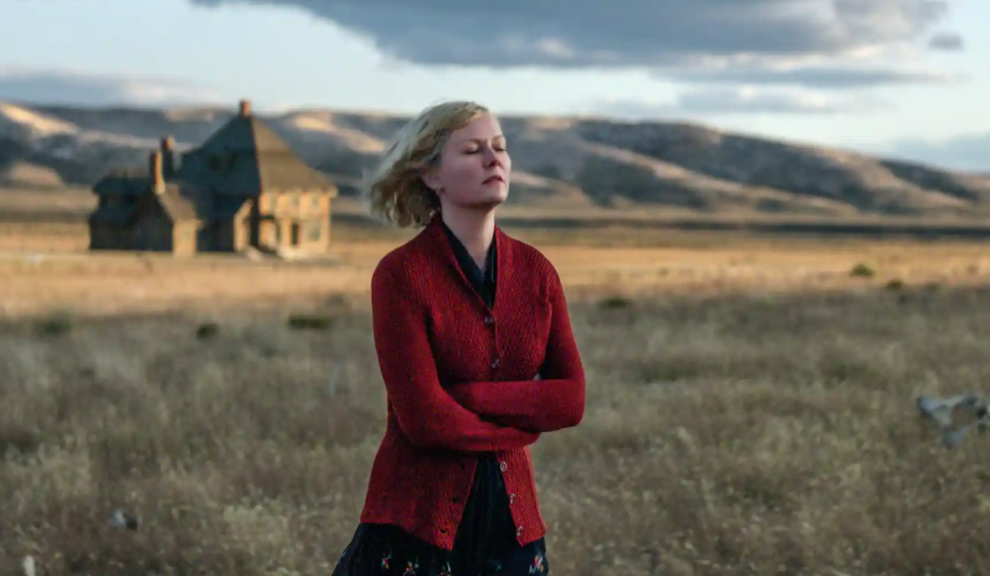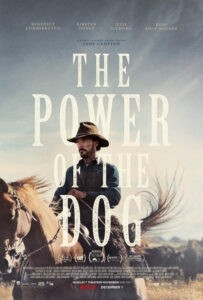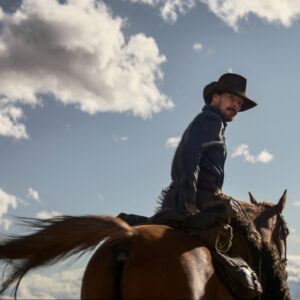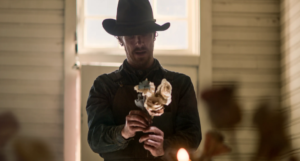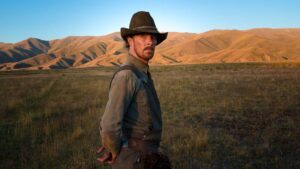Directed by Jane Campion | Written by Campion, adapting a novel by Thomas Savage | 126 min | Netflix
The Power Of The Dog is a story of brothers in the new west, in 1925, with grim, biblical overtones. George (Jesse Plemons) and Phil Burbank (Benedict Cumberbatch) have 25 years ranching in the Montana badlands — New Zealand convincingly standing in. George is reserved, you may even call him sophisticated. He’s always in a suit and tie, even on horseback. This while Phil is proud and embittered. They’re both lonely in each other’s company.
All Phil’s interested in is the past, in what he and his brother accomplished out there on the land with grit and hard work, and the legacy of his mentor, a cowboy who died decades before. He’s a model of toxicity, and when George takes a shine to a widow, Rose Gordon (Kirsten Dunst), who has a sensitive, creative son, Peter (Kodi Smit-McPhee), Phil feels threatened.
George has an interest in social climbing, inviting his parents and the governor — played by Keith Carradine, a cowboy actor if ever there was one — to dinner, while Rose bridles under the pressure of George’s dreams for them as a couple while carrying secrets of her own. Everyone here’s got secrets, maybe Phil most of all.
The film loses interest in Rose and George, shifting its focus to Rose and Peter, and then Peter and Phil. This narrative transition between character relationships challenges us to stay with the story, but despite its wandering focus the movie sticks the landing like glue — it delivers a terrifically satisfying climax, one that recontextualizes what goes before. What starts as a dusty and austere romantic tragedy ends up a homoerotic, gothic thriller.
Cumberbatch rarely takes off his shirt, or his furry chaps, until he’s alone at the swimming hole. You can imagine the stink of him. His Phil is supposed to be full of rage, but while the actor can do intellectual cruelty, he’s much better at eccentrics — he plays enough of them. Here he struggles to convincingly sustain Phil’s calcified, quarter century of anger and repression the way a Daniel Day-Lewis, John Malkovich, or Joaquin Phoenix might. He’s technically impressive, and dangerous enough for the purposes of the drama, but doesn’t capture the damaged soul of Phil. It’s a problem in a story when he’s supposed to be the source of so much suffering.
Fortunately, everyone else around him is so good, especially Dunst, who gives one of her best performances — next to maybe Melancholia. Plemons is physically starting to resemble Philip Seymour Hoffman, and showing some of the late master’s range, too. His stillness here is remarkable.
It’s a real pleasure seeing new and challenging work from Jane Campion who hasn’t made a feature since her under-appreciated Bright Star, in 2009. Her new film is pitched somewhere between Days Of Heaven and There Will Be Blood, reaching for the visual poetry of the former and the unleavened human tragedy of the latter. If it doesn’t quite achieve the grace of either it’s for no lack of ambition, and that jaw-dropping final act absolves many sins.
A final tip of the hat to composer Jonny Greenwood, who once again delivers a score that helps define the emotional landscape of the film. Given how busy he is he could probably give up his day job in Radiohead, though I’m not gonna risk death from the band’s more rabid fans suggesting he should.





